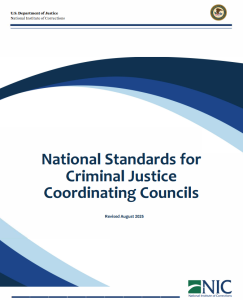
The CJCC Essential Elements document is a companion publication to the National Standards for Criminal Justice Coordinating Councils. The essential elements consist of ten key attributes associated with high performing criminal justice coordinating councils (CJCCs). The ten essential elements are: 1) systemic focus, 2) participation, 3) leadership, 4) consensus building, 5) organized meetings, 6) committees and workgroups, 7) strategic planning, 8) data and research, 9) community engagement, and 10) director and staff. Each essential element is described in the publication, and a set of key factors is also presented. The key factors are items that indicate the presence of the essential element, and they are drawn from the national standards of CJCCs (and the corresponding guiding principles of CJCCs).



